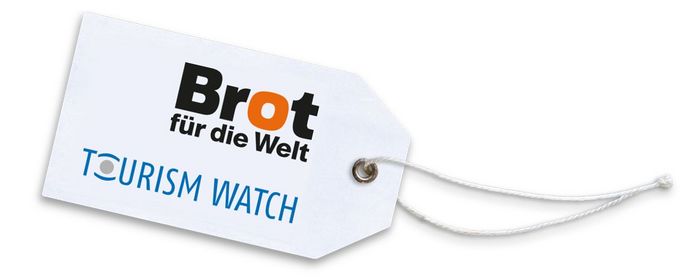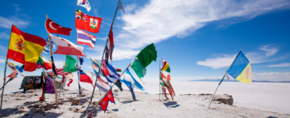By Christina Kamp
„Tourism and sustainable transformation“ – the motto of this year’s World Tourism Day on 27th September could not be more fitting when looking back at 50 years of Tourism Watch on the occasion of its special anniversary. For five decades, Tourism Watch has been a special desk of church-based development cooperation in Germany, committed to tourism and sustainable development. Its work has not just been about what is going wrong in tourism, but also about pushing for a transformation that is urgently needed: to achieve sustainability within the tourism sector and for tourism to contribute to sustainable development.
In the early years, however, the terminology of sustainability had not yet taken hold. Nevertheless, tourism was already seen in the larger context of ecumenical responsibility for peace, justice, human rights, and the integrity of creation. The 1970s and 80s were mainly about „tourism of the rich to the countries of the poor“. At a conference organised by the Caribbean Conference of Churches (CCC) in 1972, Caribbean partners made a very strong plea to the churches in the USA which has since then been regarded as the rationale for critical perspectives in development-related education on tourism in the Global North: “You are the people who have some responsibility for what is happening to our islands; you are in touch with the people who are coming to us; we want you to try and sensitise the travellers to the realities in our countries, so that their behaviour could be more appropriate and the relationships developed could be more honest kinds of relationships.”
Long-haul tourism from Germany was also growing and the impacts of so-called “Third World Tourism” became increasingly visible. In 1975, the Church Development Service (KED) of the Protestant Church in Germany (EKD) responded by establishing the then called “Zentrum für entwicklungsbezogene Bildung (ZEB) – Fachstelle Ferntourismus” (Centre for development-related education – Special desk on long-haul tourism) with offices in Stuttgart. One of ZEB’s mandates was to provide guidance for ecumenical exchange visits focused on mutual learning in a church context. The German Federal Ministry for Economic Cooperation and Development (BMZ) understood the need to raise awareness among tourists to developing countries for development-related concerns and extended its support.
In the early/mid 1990s ZEB became a special desk at Services Overseas (DÜ) in Leinfelden-Echterdingen and was renamed Tourism Watch to make it easier to handle and recognize in its international context. In 2001, the office moved to Bonn to become a desk of the Protestant Church Development Service (EED) and in 2012 to Berlin to become part of the newly merged development agency of the Protestant churches in Germany, Bread for the World.
Focus on impacts of tourism
In its educational and advocacy activities, Tourism Watch kept pointing to the negative impacts of tourism and showed the industry the „red card”. Processes of displacement, the violation of human rights, the exploitation of children, destruction of nature and the adverse impacts of travel on the climate continued to increase with globalization. Structural problems caused or exacerbated by tourism have become common all over the world, wherever tourism takes hold – to the extent of overtourism in the most popular destinations. Where carrying capacities are exceeded, local people often take to the streets in protest. Tourism influences power structures, often to the detriment of those groups of the population who were disadvantaged in the first place.
According to a motto promoted in an earlier phase of critical reflection, tourism was to be treated like garbage: Primarily, it was to be avoided. Then what remained was to be handled in an environmentally friendly and socially responsible manner. Avoiding tourism, however, has turned out to be an illusion. Tourism continues to grow and the “rich“ of today are no longer only from countries of the North. In many countries of the South, a growing and more affluent upper and middle class contribute to global tourist flows. Which means that the challenges of raising awareness of environmentally friendly and socially responsible travel have globalised as well.
Civil society cooperation
In the 50 years of its history, Tourism Watch time and again took the lead in bringing together civil society players from North and South and making their voices heard. They addressed challenges like the commercial sexual exploitation of children in tourism, free trade in services and fair trade, a Global Code of Ethics for Tourism, guidelines on tourism and biological diversity, and tourism in the Rio process under the UN Commission for Sustainable Development (CSD). In all these areas cooperation with the Ecumenical Coalition on Tourism (once ECTWT, later ECOT) and/or other partners made it possible to intervene with critical analyses and coordinated positions. The international campaign “End Child Prostitution, Child Pornography and the Trafficking of Children for Sexual Purposes (ECPAT)” launched in 1990 has grown into a network that currently comprises of 142 ECPAT members in 115 countries. Over decades, Tourism Watch also cooperated with European partner organisations in the TEN network of tourism NGOs.
At the World Social Forum (WSF) and other civil society platforms such as the Asia Europe People’s Forum (AEPF) and the International Tribunal on Evictions it was thanks to such cooperation that tourism-related concern were included in a broader international debate on development and social concerns.
For more Corporate Social Responsibility in Tourism
At tourism trade fairs such as Reisepavillon (1991-2010) and since the mid-1980s the International Tourism Exchange (ITB) in Berlin Tourism Watch and partner increasing raised awareness of development and sustainability concerns among industry players in tourism. Tourism Watch initiated and supported initiatives to develop, promote and implement criteria for sustainability in tourism.
To this effect, in the mid-1990s the Institute for Tourism and Development (Studienkreis für Tourismus und Entwicklung) and Tourism Watch developed the TO DO Award Socially Responsible Tourism. The contest has since then been organised annually by Studienkreis. Its key criterion has been the participation of local people in the planning and implementation of tourism projects.
From the early 2000s, together with kate Environment & Development, Tourism Watch promoted the implementation of Corporate Social Responsibility (CSR) in the tourism industry and in 2009 co-founded TourCert as a non-profit association (GbR) for certification in tourism. In 2015, TourCert was transformed into a non-profit limited liability company (gGmbH), qualifying and certifying tourism enterprises and destinations with regard to their economic, ecological and social sustainability.
Placing special emphasis on human rights due diligence of companies, in 2012 Tourism Watch co-initiated the Roundtable Human Rights in Tourism. The roundtable was set up as a multi-stakeholder platform and was soon converted into a non-profit organisation based in Berlin.
Tourism and sustainable transformation
With the 2030 Agenda and the 17 Sustainable Development Goals (SDGs), development cooperation got a new international framework in 2015. It calls for increased responsibility in the Global North, especially with the regard to challenges like climate change which were predominantly caused by affluent nations – and to which tourism is a major contributor. To analyse how tourism may contribute to the SDGs and whether and in what respects it may be counterproductive, Tourism Watch works with the “Transforming Tourism Initiative” network. As more and more tourism NGOs had to give up – especially due to lack of funding, not because they were no longer needed – this initiative is aimed at involving new partners whose concerns are strongly linked to the work of tourism NGOs.
“Keep on fighting!”
This was the title of an article in the late 1990s on the then new fields of activity and the changed self-image of tourism NGOs. Today it is more pertinent than ever. Though there is more awareness of the points raised by Tourism Watch, among many travellers and within the industry, implementation is still lacking. And in times of multiple crises sustainability is all too often sacrificed, giving priority to other seemingly more “urgent” concerns.
After 50 years, the challenges do not just remain, they keep growing. In the future there will be a need for even better coordinated and strengthened solidarity and advocacy to ensure that tourism supports sustainable transformation rather than undermining it. It still cannot be taken for granted that the concerns of people affected by tourism are being heard and considered and that sustainability debates include human rights and principles of justice as key elements.





